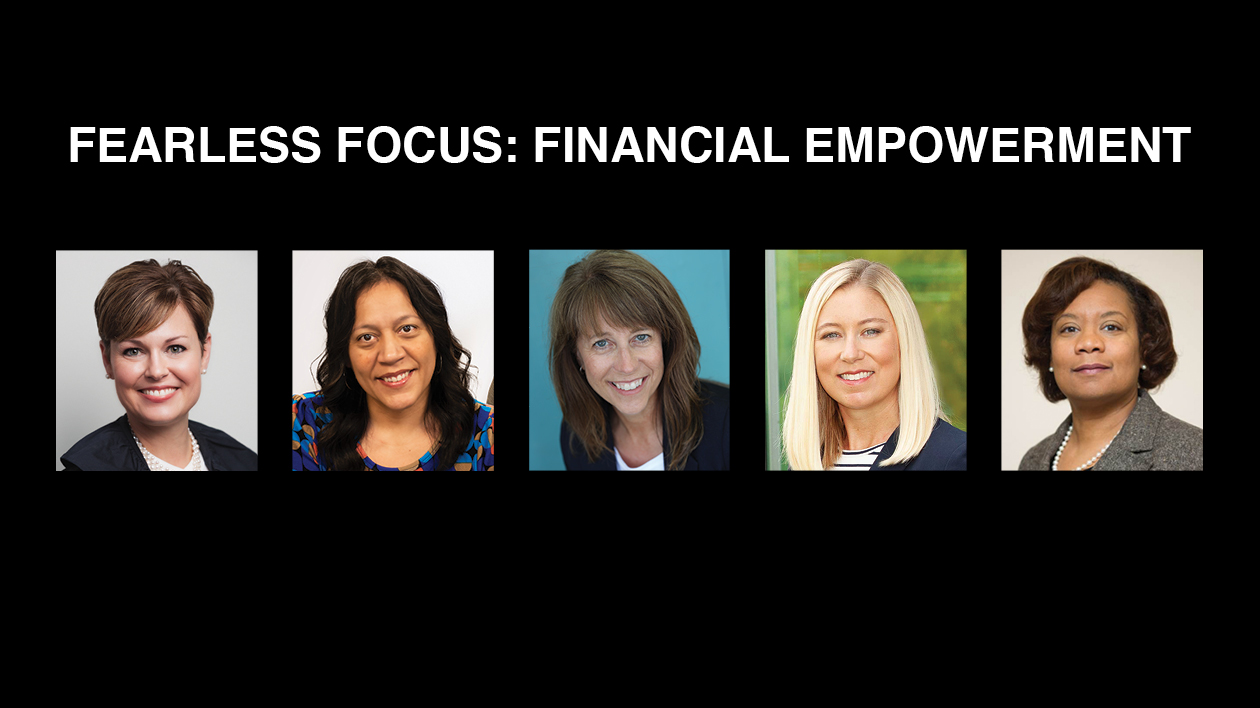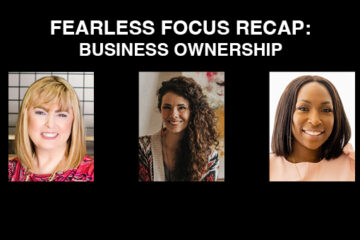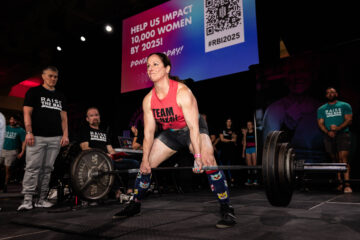Fearless panel on financial empowerment: It’s not just the wage gap keeping women from security

Kara Hoogensen told her co-panelists an uncomfortable statistic.
“The fact is, there’s five panelists here on this event today. Odds are, at least one of us is going to go through a period of time during our career where we’re unable to work for a lengthy period of time. And it can be a very big challenge,” said Hoogensen, senior vice president and head of workplace benefits – benefits and protection at Principal Financial Group.
One solution can be good partnerships between the government and the private sector, she said.
“So one of the movements here in the states – and we are seeing this happen – more states embrace paid family medical leave programs and more employers that are supplementing those programs. Or in states where those programs don’t exist, offer short-term disability coverage for purposes of people at least taking care of their own illness and injury and having an income stream,” Hoogensen said.
Women are traditionally the caregivers – of children, of aging parents, of the sick and the dying. Women are more likely to suffer from autoimmune diseases. Women are more likely than men to be diagnosed with anxiety and depression. They also typically outlive men. All of this can affect their career trajectory, their budgets and their finances.
Over the years, many Iowa women have told Fearless that they struggle with aspects of their personal finances. They’re often ashamed. To help Iowa women with this challenge, our first Fearless Focus panel of the year was on financial empowerment.
The April 18 panel included:
- Kara Hoogensen, senior vice president and head of workplace benefits – benefits and protection, Principal Financial Group
- Marcie Ordaz, executive director, Lift Women’s Foundation
- Sonya Sellmeyer, consumer advocate, Iowa Insurance Division
- Ashlee Vieregger, senior lead adviser, Foster Group
- Michele Williams, associate professor, management and entrepreneurship, University of Iowa Tippie College of Business
Suzanna de Baca, president and CEO of Business Publications Corp., introduced the panelists. Emily Wood, the Business Record’s special projects editor, moderated the discussion.
Wood’s first question was solutions-oriented: What is one financial barrier that adversely affects women? How does the business community play a role in addressing it?
The following responses have been edited and condensed for clarity.
Hoogensen:
We find that 68% of women, relative to 80% of men, feel financially secure. What do we mean when we say “financially secure?” We mean, they feel comfortable that they can get a loan. They feel comfortable that they can get a mortgage. They feel comfortable that they can make investment decisions, whether that be an employer-sponsored retirement plan or outside of that. So, there is absolutely a discrepancy here.
Employers play a big role. Employers are the most trusted institution in the United States. From my perspective, the role that employers play in helping their talent, particularly their female talent, make sure that they understand what they have access to and provide the education and support. To really get super specific around one of the challenges that we focus on at Principal – that really is the income-protection gap.
The child care responsibilities, being able to take time off, whether that be for one’s individual illness or sickness or to care for a loved one, is a major issue. If there’s not an income stream coming in, you as an individual may or may not be in a position to be able to do what in your heart of hearts you want to do in providing care for another or for oneself.
Ordaz:
Over the last few years, I’ve had the opportunity to move into a career in nonprofit, working with small-business women entrepreneurs, and also taking the time for myself to really jump in and be better about my learning and education around financial stability.
One of the things that I recognized not too long ago was the barrier for women to maintain an almost equal opportunity to have retirement funds built. When I first heard some statistics from a peer of mine, it just kind of blew me away. I didn’t think about the time I took off when I had my kids – I felt so fortunate to take a year off for each of my two girls. And now I’m thinking, “Oh my gosh, that’s one year of retirement money tucking away, plus match programs, that I just missed out on.” But I also wanted to be with my children.
Statistically, we’re the ones who are taking those long-leave absences to care for family members, to care for children. We’ve seen it heightened after the pandemic. The U.S. Department of Labor says the impact of taking time off for a woman is a 15% difference in wages lost, compared to what men are earning. And that’s on top of wage gaps already.
So I really feel like as a business community, there has to be some sort of program or first acknowledgement of that loss for women when planning for retirement, and really identify how can we fill those gaps, not for us working today, but for the time that we are ready to retire – if we can retire. I joke with my kids all the time. And I said, “Hey, there’s not going to be anything left for you when I’m gone. And I’m probably going to work till I die.”
But I’m teaching them things that I’m learning in my 40s that I wish I had known. So that way, they’re not in the same situation that I’m in. I just think, as a business community, we’ve got to all do better, men and women, of just identifying that and figuring out, how do we build programs around retirement planning for our future?
Sellmeyer:
We polled approximately 350 Iowa women, and we asked them, how is your household financial situation? What do you want to know more about?
I wasn’t surprised to learn they wanted to know more about retirement planning and investments, because the information out there is lacking for women. And so we got that information. I started digging around into it a little bit more and found out that we – women and men – spend a lot of time worrying about our finances while we’re at work. I found a study by PricewaterhouseCoopers that was conducted in January of 2023 that found that 50% of all workers spend three or more hours per week dealing with their finances or worrying about their personal finances while we’re at work. Three hours a week for 56% blew me away. That’s a lot of lost productivity while we’re at our workplace.
I think employers can do a lot to help with the financial literacy efforts and have that as a benefit in our workplace – offering that empowerment and confidential financial wellness program to their employees as a benefit for men and women. But as the poll showed, I think maybe women need it more. Our poll showed that as well – that women felt that they were behind on that financial literacy curve. So I really do think that financial education, with the support of our employers, with coaching webinars, online tools, would provide flexibility for different learning styles as well. And it translates into a healthier workplace, happier and productive employees.
Vieregger:
Pay inequality – inequity – persists, and that’s just one part of the puzzle. Equal work, equal compensation, is not the reality that a lot of women experience today.
A decade’s worth of research by McKinsey and Co. found that women are also overrepresented in low-wage occupations. So it’s not just a matter of equal work for equal pay, but women occupy a lot of low-wage occupations in comparison with men of a similar education level of attainment. So yes, income is a big deal. But there’s also a confidence gap that persists.
There’s something that the business community can do to help remedy these income-related challenges. And then there’s also the question of what can we do individually to feel more confident. With respect to the income-related challenges, companies and businesses need to continue to promote women in equal measure to men to fix this leaky talent pipeline that persists, meaning women, when they start in entry-level positions, there are fewer and fewer who advance to manager or senior manager or executive level.
At every level, there’s a leaky pipeline there. And so by promoting and investing in career-development opportunities, and particularly for women of color, who are very underrepresented in executive leadership, we have to invest in those training, development and leadership opportunities, in addition to promoting equitably across gender lines.
On the confidence piece, I feel like a big part of that disparity and disconnect happens because a lot of us simply are not comfortable talking about money and finances. It’s the last great taboo in American conversation. We’d rather talk about death, we’d rather talk about politics, we’d rather talk about religion, than how to have a money conversation on what an appropriate salary would be, or how to engage in a negotiation when you’re approaching a new career opportunity, or how much you should be saving or investing or the shame of carrying significant debt, which can just feel overwhelming to a lot of women.
So we have to be more comfortable talking about that, and breaking down that taboo so that we can gain confidence. Because the research is clear. When we talk about these topics with the other trusted people in our lives, both women and men, confidence in our financial decisions only grows. It doesn’t decrease.
So I am very focused on breaking what we’ll call money silence taboo in the work that I do with client families across generations. Because if we can’t talk about this comfortably as adults, what message or inspiration or education are we modeling for the next generation? We want them to be more equipped with these skills and have more comfort than maybe we were raised with.
Williams:
A lot of times people who are experiencing a gender wage gap don’t know they’re making less than the person sitting next to them, and so when we talk about the gender wage gap, women are paid on average 84 cents to the dollar of what men are paid. And this gap is larger for Black women compared to white men and larger for Hispanic women and Latina women, so this is both broken down by gender and then intersectionality with other forms of ethnicity.
I’ve taught negotiation for a long time, and one of the differences between men and women in terms of starting out at that first salary is men tend to negotiate their salary more often than women, and women don’t negotiate for multiple reasons. It’s not that women don’t necessarily know about negotiating and asking for more. More is better than less, right? Women know that. But there can be backlash against being more assertive based on stereotypes.
What the research has found coming out of Harvard Kennedy School is ways for women to express confidence. Women express confidence in nonverbal ways – so the tone of their voice, the way they dress, the way they stand – they don’t get the same backlash for negotiating. Or, in addition, when women present what they’re negotiating for in terms of a more relational aspect … so, being a team player. When you come to a job and negotiate, people should see that as a value added.
If you can’t negotiate in your job, you’re not going to be as good an employee, so it’s an example of a skill that you need to do well in your job.
Here at Tippie, every single person who goes through the business school takes a negotiation course. They learn the No. 1 thing in negotiation is setting high aspirations. The more you ask, the more you ask for and the more you desire, the more you’re likely to get, right? You shoot for the stars and you may land on the moon, but it’s still more. A lot of times, women accept the first offer they’re given, and no organization is giving you the best offer in that first situation.
I was doing a consulting opportunity one time. The person had offered $15,000. I was offended but I didn’t walk away from the table and I just came back with a lot of analysis: What are the going rates, what are the expenses to do this job? I said, “This is too little; these are the things that I would need to do to carry out the job.” And the person came back and said, “OK, would $75,000 be OK?” And what I realized is that I had misheard them. This was a negotiation over the phone, and the first time they had said $50,000. Had I heard them correctly, I would not have negotiated as hard and I didn’t know their budget, so a lot of times you don’t really know what the full budget is, so you want to negotiate.
You also want to research it. There’s Glassdoor, there’s LinkedIn, there’s lots of sources that you can go to to find what the average salary is, and you don’t want to be basing that on your previous salary.
So at the beginning of the pandemic, a lot of people were moved from government types of jobs to the tech industry. The salary base is totally different, and if you just wanted a little bit more than you were making previously, you wouldn’t be getting paid what the job is worth.
I’ve talked to numerous people in tech who found out that the person sitting next to them was making $20,000 or $30,000 more than they were making, and they just didn’t have that information, so talking about salaries – asking people what their salary is. I know that’s uncomfortable, but that type of transparency among women is going to be critical. But not just among women, right? You don’t want to be the best-paid woman. You want to be the best-paid person, so you also need to be talking and sharing this information with your male colleagues.
If it’s uncomfortable to ask “What are you making?” you can ask, “Oh I’m thinking about asking this salary. Does that sound reasonable or is that too low?” They’re going to tell you immediately, “Oh no, that’s way too low, you should be asking for $20,000, $30,000 more. They’re not telling you what they’re making but they’re giving you a range that you can then start to work with.
I know groups of women who have made a Google sheet, and everyone put in what they’re getting paid for different speaking opportunities so that they could see what they should be paid. So setting those aspirations high, doing your analysis, these are critical to getting paid what you’re worth. But also, those activities build your confidence.
The last thing I’m just going to say is always practice – practice with your friends, practice with your colleagues, even if you can only practice in front of a mirror, practice saying that number because the first time you say that high number should not be in a high-stakes negotiation, because it won’t roll off your tongue and it won’t come out confidently.
Watch the full panel at fearlessbr.com/events.


